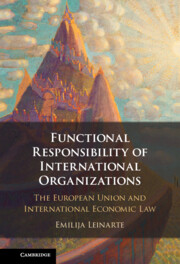 Functional Responsibility of International Organisations
Functional Responsibility of International Organisations from Part I - The Legal Foundations of the International Responsibility of the European Union
Published online by Cambridge University Press: 09 December 2021
Chapter 2 explores the ILC framework of international responsibility. The aim of the analysis is to identity rules which govern the allocation of international responsibility in a multi-layered structure where sovereignty is shared between different subjects of international law. This study argues that the purpose of both the ARIO and the ARSIWA is to determine whether a subject of international law is internationally responsible. If the question of responsibility arises in the context of a multi-layered structure, such as that of the EU, additional questions arise. The allocation of international responsibility within an international body falls outside the scope of the ARIO framework. Instead, this book suggests looking for guidance in the rules of organisation and the international dispute-settlement practice in which these rules operate.
To save this book to your Kindle, first ensure no-reply@cambridge.org is added to your Approved Personal Document E-mail List under your Personal Document Settings on the Manage Your Content and Devices page of your Amazon account. Then enter the ‘name’ part of your Kindle email address below. Find out more about saving to your Kindle.
Note you can select to save to either the @free.kindle.com or @kindle.com variations. ‘@free.kindle.com’ emails are free but can only be saved to your device when it is connected to wi-fi. ‘@kindle.com’ emails can be delivered even when you are not connected to wi-fi, but note that service fees apply.
Find out more about the Kindle Personal Document Service.
To save content items to your account, please confirm that you agree to abide by our usage policies. If this is the first time you use this feature, you will be asked to authorise Cambridge Core to connect with your account. Find out more about saving content to Dropbox.
To save content items to your account, please confirm that you agree to abide by our usage policies. If this is the first time you use this feature, you will be asked to authorise Cambridge Core to connect with your account. Find out more about saving content to Google Drive.